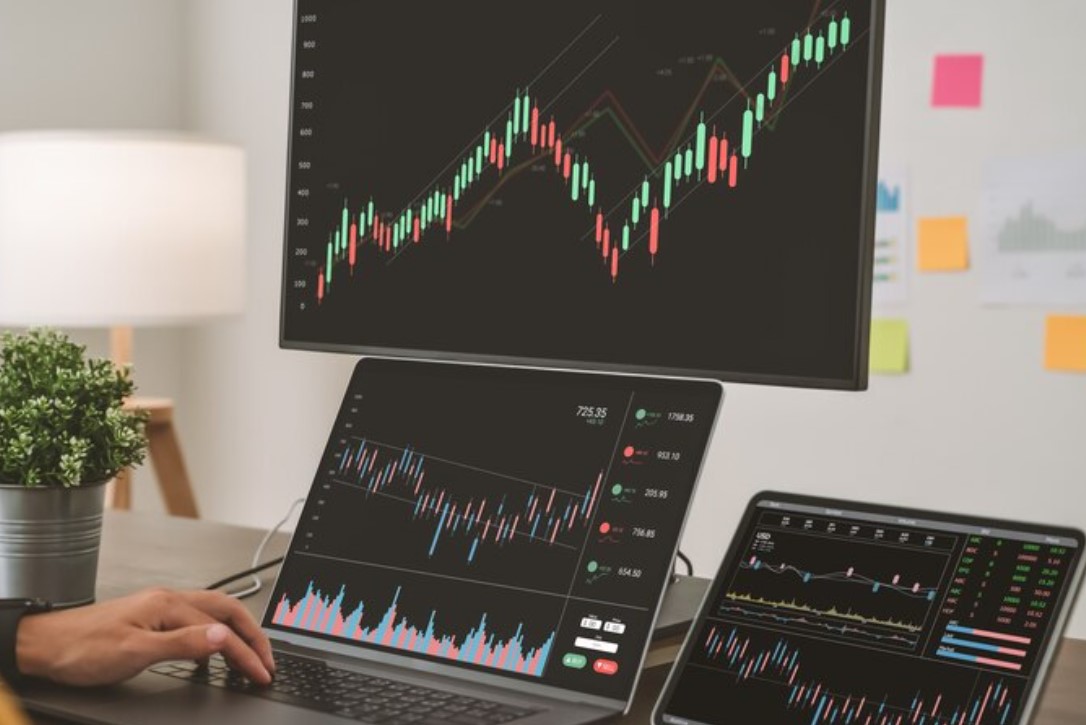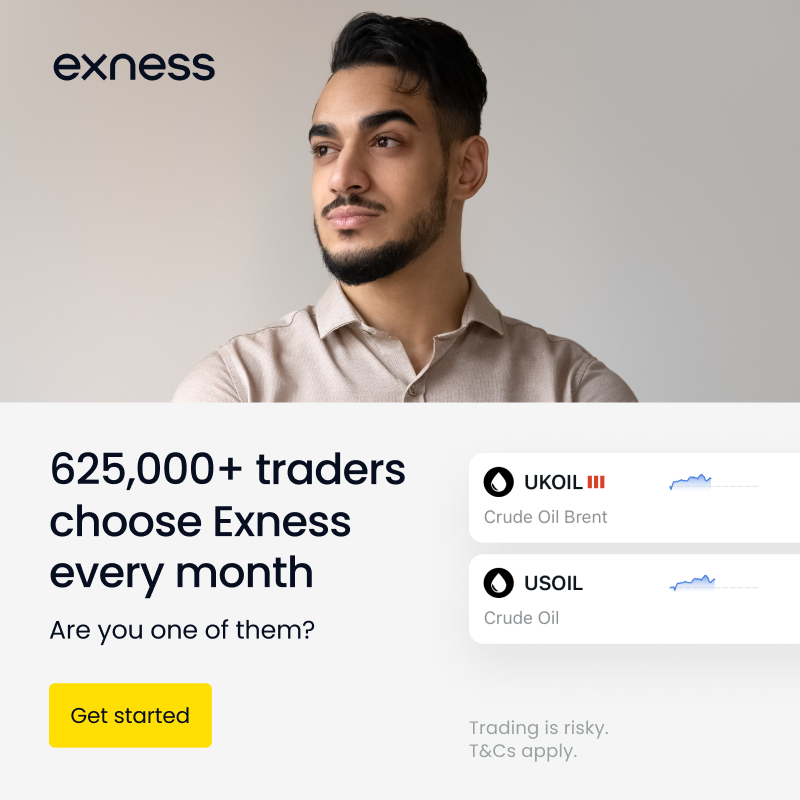
9 minute read
How to Open a Forex Account in Dubai
from Exness India
by Exness_India
Dubai, one of the most vibrant financial hubs in the Middle East, offers an excellent environment for forex traders. With its modern infrastructure, high-tech trading platforms, and a growing number of forex brokers, Dubai is a prime destination for both novice and experienced traders. The ease of access to global forex markets has made it increasingly popular for traders from around the world to open forex accounts and start trading.
Top 4 Best Forex Brokers in Dubai
1️⃣ Exness: Open An Account or Visit Brokers 🏆
2️⃣ JustMarkets: Open An Account or Visit Brokers ✅
3️⃣ Quotex: Open An Account or Visit Brokers 🌐
4️⃣ Avatrade: Open An Account or Visit Brokers 💯
In this comprehensive guide, we will walk you through the process of opening a forex account in Dubai, the legal aspects of forex trading in the UAE, the benefits of trading from Dubai, and essential tips for success. Whether you're a beginner looking to start your forex journey or an experienced trader considering Dubai as your trading base, this guide will provide all the necessary information.
Understanding Forex Trading in Dubai
Before diving into the process of opening a forex account in Dubai, it’s important to understand what forex trading entails, the regulatory landscape in the UAE, and why Dubai is such an attractive location for forex traders.
What is Forex Trading?
Forex trading involves the buying and selling of currencies in the foreign exchange market. Unlike other financial markets, the forex market operates 24 hours a day, five days a week, enabling traders to buy and sell currencies at any time, depending on their preferred trading sessions.
The goal of forex trading is to profit from fluctuations in the value of one currency relative to another. For example, if you believe the US dollar will strengthen against the Euro, you can trade the USD/EUR pair by buying USD and selling EUR. If the value of the USD rises, you can sell your position to lock in profits.
Why is Dubai a Popular Forex Trading Hub?
Dubai has established itself as one of the world’s leading financial centers, and its appeal to forex traders has only grown over the years. The reasons why Dubai is a sought-after location for forex trading include:
Tax Benefits: Dubai has a tax-friendly environment, with no personal income tax, capital gains tax, or sales tax. This makes it an attractive place for traders looking to maximize their profits.
Financial Infrastructure: Dubai has world-class financial institutions, trading platforms, and high-tech infrastructure that enable smooth trading operations. The Dubai International Financial Centre (DIFC) provides a secure and well-regulated environment for traders.
Regulation: The UAE has established robust regulatory frameworks for forex trading, which ensures that brokers and traders adhere to high standards of operation. The presence of trusted regulatory bodies like the Dubai Financial Services Authority (DFSA) adds a layer of security for forex traders.
International Connectivity: Dubai's strategic location between the East and West, along with its global connectivity, makes it an ideal place for traders to access international markets.
Professional Forex Brokers: Dubai is home to several well-known, internationally regulated forex brokers, providing a wide range of options for traders.
Legal Aspects of Forex Trading in Dubai
Forex trading in Dubai is legal, and the UAE government has made efforts to create a safe and regulated environment for both domestic and international forex traders. However, there are specific regulations that traders should be aware of before opening a forex account.
Regulatory Authorities in Dubai
Dubai is home to a number of financial regulatory bodies that oversee forex trading activities in the UAE. Some of the key regulatory authorities include:
Dubai Financial Services Authority (DFSA): The DFSA is the primary regulatory authority for financial services within the Dubai International Financial Centre (DIFC). It provides licensing and regulation for forex brokers operating within the DIFC, ensuring compliance with global financial standards.
Central Bank of the UAE (CBUAE): The CBUAE regulates financial institutions and banks in the UAE, ensuring stability in the country’s financial system. While it doesn’t directly regulate forex brokers, it plays an important role in the overall financial ecosystem.
Securities and Commodities Authority (SCA): The SCA is the UAE's regulatory body for the securities markets, including the supervision of forex trading activities across the broader UAE.
Forex brokers in Dubai must be licensed and regulated by one of these regulatory bodies to ensure that they adhere to legal standards. Choosing a regulated forex broker is important for traders, as it helps protect their investments and ensures that the broker follows proper procedures.
Is Forex Trading Taxable in Dubai?
One of the major benefits of trading forex in Dubai is the absence of taxes on profits. Unlike many other countries, the UAE does not impose personal income taxes or capital gains taxes on individuals, including forex traders. As a result, traders can retain all of their profits from forex trading without worrying about paying taxes to the government.
However, it is important to note that some regulatory fees may be applicable depending on the broker, the trading platform, and the country of origin of the trader. It’s advisable to research the fees associated with your chosen broker before opening an account.

💥 Trade with Exness now: Open An Account or Visit Brokers 🏆
Step-by-Step Guide to Opening a Forex Account in Dubai
Opening a forex account in Dubai is a straightforward process. By following a few simple steps, you can get started with forex trading in the UAE. Below is a step-by-step guide to help you navigate the process.
Step 1: Choose a Regulated Forex Broker
The first step in opening a forex account in Dubai is selecting a regulated forex broker. As mentioned earlier, it's essential to choose a broker that is licensed by a reputable regulatory authority, such as the Dubai Financial Services Authority (DFSA) or the Securities and Commodities Authority (SCA).
Here are a few things to consider when choosing a forex broker in Dubai:
Regulation and Reputation: Always check whether the broker is regulated by a recognized authority like DFSA or SCA. This ensures that the broker is compliant with industry standards and provides a secure trading environment.
Trading Platform: Most forex brokers offer platforms like MetaTrader 4 (MT4) and MetaTrader 5 (MT5), which are widely used for trading forex. Choose a broker that offers the trading platform you are comfortable with.
Account Types: Forex brokers offer various account types to suit different trading needs. Make sure you choose an account type that matches your experience level, trading goals, and risk tolerance.
Spreads and Leverage: Compare the spreads (the difference between the buy and sell price) and leverage offered by different brokers. Lower spreads and reasonable leverage can make your trading more profitable.
Customer Support: Opt for a broker with a responsive customer support team available 24/5, as forex markets are open during different time zones.
Deposit and Withdrawal Methods: Check the deposit and withdrawal methods available, and ensure the broker supports methods that are convenient for you, such as bank transfers, credit cards, or e-wallets.
Step 2: Open a Trading Account
Once you’ve selected a broker, the next step is to open a trading account. Here’s how to do it:
Fill Out the Registration Form: Visit the broker’s website and complete the registration form with your personal details, including your full name, email address, phone number, and residential address.
Submit Identification Documents: Forex brokers are required to verify your identity through the Know Your Customer (KYC) process. You will need to submit proof of identity (such as your passport or national ID) and proof of address (such as a utility bill or bank statement).
Agree to the Terms and Conditions: Review and accept the broker’s terms and conditions. This is a standard step in the account opening process.
Account Approval: Once you submit the necessary documents and agree to the terms, the broker will review your application. If everything is in order, your account will be approved, and you will receive your login credentials.

💥 Trade with Exness now: Open An Account or Visit Brokers 🏆
Step 3: Deposit Funds into Your Account
After your account has been approved, you will need to deposit funds to start trading. Forex brokers in Dubai typically offer several payment methods for depositing funds, including:
Bank Transfers: Most brokers allow you to deposit funds via local bank transfers in Dubai, such as through Emirates NBD, Dubai Islamic Bank, and Mashreq Bank.
Credit/Debit Cards: You can also use Visa or MasterCard credit/debit cards to deposit funds into your forex account.
E-Wallets: Some brokers accept digital payment methods like Skrill, PayPal, or Neteller for easier transactions.
Cryptocurrency: Certain brokers may accept cryptocurrencies like Bitcoin for deposits.
Make sure to check the minimum deposit requirements and the fees associated with each payment method.
Step 4: Download the Trading Platform
Once your funds are deposited, the next step is to download the broker’s trading platform. Popular forex trading platforms like MetaTrader 4 (MT4) and MetaTrader 5 (MT5) are compatible with Windows, Mac, and mobile devices, allowing you to trade anytime, anywhere.
Step 5: Start Trading
Now that your forex account is set up and funded, you can start trading. However, if you're new to forex trading, it’s a good idea to start with a demo account. A demo account allows you to practice trading with virtual funds, helping you gain experience before committing real money.
Tips for Successful Forex Trading in Dubai
To be successful in forex trading, it's essential to follow some key principles and best practices:
Educate Yourself: Forex trading requires a strong understanding of the market, trading strategies, and risk management. Take the time to educate yourself through online courses, webinars, books, and demo trading.
Start Small: Begin with a small investment and gradually scale up as you gain experience. Avoid risking large amounts of money in the beginning.
Use Risk Management Tools: Always use stop-loss orders to limit your losses. Risk management is crucial in forex trading, and setting clear exit points can help protect your capital.
Stay Informed: Stay updated on global financial news and economic events that can impact currency prices. This will help you make informed trading decisions.
Be Patient: Forex trading requires patience and discipline. Avoid impulsive decisions and stick to your trading plan.
Conclusion
Opening a forex account in Dubai is a relatively simple process, but it requires careful consideration of various factors such as broker selection, regulatory compliance, and trading platforms. Dubai offers a tax-friendly environment, robust financial infrastructure, and a variety of forex brokers, making it an attractive destination for traders around the world.
By following the steps outlined in this guide and adhering to sound trading principles, you can start your forex trading journey in Dubai and increase your chances of success. Remember to educate yourself continuously, practice risk management, and stay updated with the latest market trends to enhance your trading performance.
Read more:




